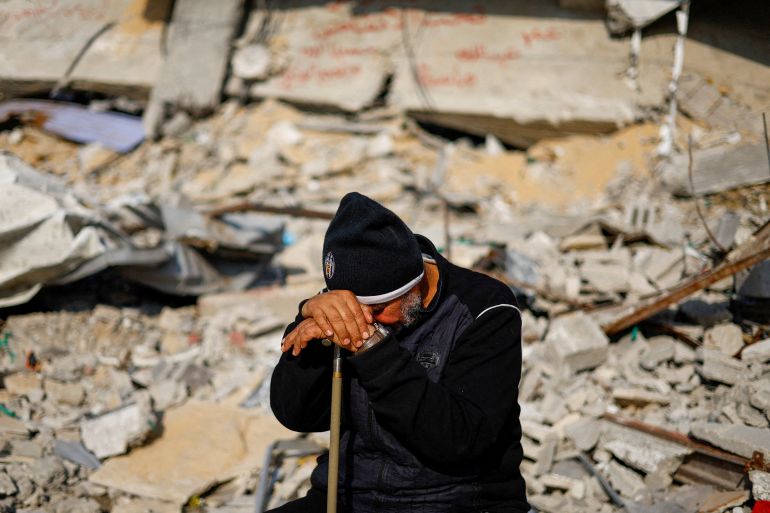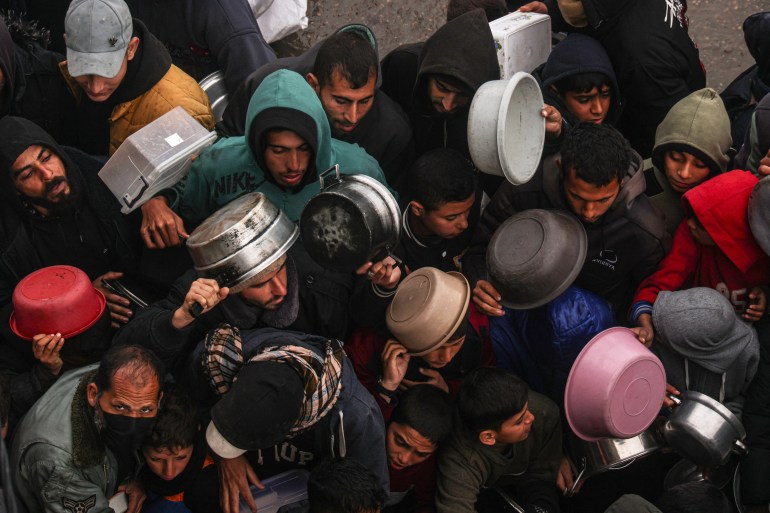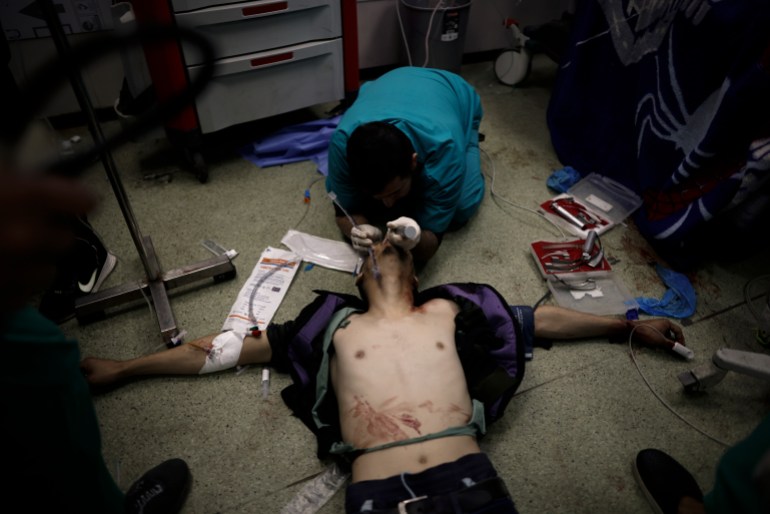‘We’re being starved’: Dispatch from Gaza City as Israeli assault continues
‘I don’t write to engender sorrow. Had sorrow moved people, we wouldn’t be where we are now,’ writes Mohammed Mhawish from Gaza City.

For us in Gaza City, enduring the daily struggles like staying safe, fighting hunger and protecting ourselves against the biting cold is a war in and of itself as Israel’s assault on Gaza grinds on past 120 days.
Hundreds of thousands of people have lost their homes at a time when that was all they had. Then after that came the loss of a simple place to shelter as Israel bombed them all: hospitals, schools, clinics, and any open space where civilians gathered.
Keep reading
list of 4 itemsRafah rescue team uses pulley to retrieve man injured by Israeli attack
Israeli air strike destroys residential tower in Gaza
Hamas heads to Cairo, Blinken in Riyadh in push for Gaza truce
The entire population of Gaza has been displaced. The entire population.
What does ‘home’ mean?
After our house was bombed, I was no longer just a witness to the thousands of people fleeing their homes to find safety wherever they could.
We went to the United Nations shelter in the north of Gaza, my family and I gathering whatever would help us survive and becoming displaced like our countrypeople.
There are about 600,000 people in north Gaza grappling with loss amid deprivation, starvation and disease because they do not want to leave their land.
It breaks my heart, but I have to admit we’ve lost the sense of what “home” means.
Just finding the bare minimum space and shelter from the elements we need to rest has become a journey of heartache and pain, our miserable daily routine of looking around to see where we can possibly sleep.
My family – father, mother, sister, wife, and two-year-old son – and I are seeking relative refuge in the parking garage of a destroyed apartment building.
We dread looking at the weather in these winter conditions. All day, we’re trying to find the forecast, breathless, worried that rain would be expected that night.
On rainy nights, I take off my coat and wrap it around my baby, making it both a blanket and protection for him against the cold, with hope and prayer that it will be enough for his small body.
Survival rations
Beyond shelter is the struggle for food. I cannot recall the last proper meal my son had.
Wheat is nowhere to be found so we have been using animal feed-grade barley and corn to grind into flour for bread. Even these alternatives are scarce, but they are our only means to get through the day.
It’s not like there is the space and security to grow your own food either, with the bombs and intentional choking off of supplies, even water. The aid entering this besieged enclave is very limited and cannot cover our basic daily needs.
So we have had to try to survive for these past four months, with no incomes or livelihoods as the prices of essentials skyrocket, if you can find them at all.

As a result, starvation is beyond widespread in the north of Gaza. Babies, children, adults and the elderly all are suffering from the lack of food.
An ounce of coffee used to be 10 shekels (about $2.75) and now it costs 120 shekels ($33); a litre of drinking water that cost a shekel (less than $0.30) is now 15 shekels ($4).
If you secure food, you still have to cook it and, with no cooking gas, people are combing the ruins to find anything they can burn for a cooking fire, exposing themselves to bombing at any time.
And so, when every hour of the day is spent either looking for food or a means to make it, we cannot always worry about staying safe.
Unrecorded deaths
Medical services in north Gaza have been nearly inoperable since the beginning of the ground invasion, and now there is little more than first aid services for the injured or those in need of intensive medical care.
Israel has arrested and killed hundreds of medical personnel, bombed hundreds of medical facilities of various sizes out of service or depleted their capacity with cuts of fuel and water.
For the little that remains functional, how would the wounded get there when at least 122 ambulances have been targeted and bombed? Then comes the danger of the streets: air strikes, soldiers kidnapping Palestinians or shooting them dead, and the mountains of rubble across Gaza.
Even basic medications like antibiotics and painkillers have been scarce for the thousands suffering injuries from Israeli attacks, and so they get infections and respiratory diseases.
People need to understand that the number of Palestinians killed in this aggression is much higher than what is being reported. Palestinians dying from kidney failure, from cancer, from disease, from a lack of prenatal care – all of these are not being recorded.
People could have been helped had there been enough equipment and medicine. People can be saved, but there seems to be little intent to save them.
I report through my phone when I manage battery and access to the internet or phone service – an endeavour more difficult than ever in north Gaza.
Banks, post offices, transportation and telecommunications all do not work.
The list is endless. How can I capture or explain to the world, the ones that even read our words, that what is being endured is not only painful but avoidable?
Our calls for support are not for abstract words of diplomatic solidarity, but for urgent action that helps us feel human in the eyes of the world.
With every passing hour, fewer and fewer Palestinians in Gaza can appeal to the world. Every day brings more death, and the rest of us remain, trying to fight off death.

In closing
I do not write of the struggle we are living to engender sorrow. Had sorrow moved people, we wouldn’t be where we are now.
I outline our struggle because, at this point, we have either already been killed or are in the process of being killed slowly.
We are appealing to the healthy ones, the ones with a bed to sleep on, the ones whose voices can be heard outside this slaughterhouse.
I write to equip you with the knowledge of what humanity is undergoing. We the Palestinians of Gaza are being starved, are sleeping on the streets with no cover from air strikes.
We are being denied our humanity by an army that continues to inflict some of the most painful and inhumane practices of war we know in our modern day.
It’s time for the world to defy the abuses, to give regard to human life, to keep it simple and basic, like the needs we require to maintain breath.